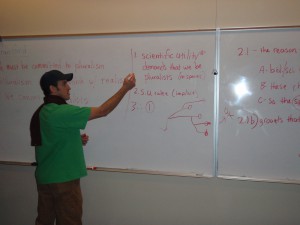
I caught up with Steve Capone right before he embarked on a marathon grading session. Steve is in the midst of finishing his coursework in the Philosophy Ph.D. program at the University of Utah (Salt Lake City) and we spent a few minutes commiserating about grading. But it turns out that the life of the mind–at least in the Rocky Mountains–has some pretty great perks. Aside from his academic pursuits, Steve skis and snowboards. He has a season pass at Snowbird, and was planning on getting out to The Canyons Resort the day after we spoke.
“I’ve been so busy with work that I’ve probably been out there only ten days,” Steve told me. It’s the kind of complaint that would roil the blood of any skier locked in the frigid flatness of the nation’s midsection (read, any MAPHer past or present suffering through the useless cold early spring weather).
Steve graduated from MAPH in 2007 and spent a year in his hometown of Pittsburgh, PA. Asked to describe his gap year, Steve recalled, “I managed a bookstore and prayed that I got into a Ph.D. Program.” Things worked out, and he is now on track to finish and defend his comprehensive paper (which Utah does in lieu of an orals exams) in the Fall. For this paper, Steve is working on a critique of luck egalitarianism. Though he is also working on a project related to the popular scholarship of Richard H. Thaler and Cass Sunstein (authors of Nudge), we spent the bulk of our conversation talking about luck egalitarianism, and its various critiques.
Steve explained that proponents of luck egalitarianism argue that institutions should enact policies that compensate people for disadvantages over which they have no control, but should not compensate persons who end up in disadvantageous positions by virtue of their own choice. Or in Steve’s words, “We have to compensate people for their bad luck, but hold them accountable for their bad choices.”
Steve is making the argument that “luck egalitarianism fails to respect people in a really important manner .” More specifically, he is suggesting that “perhaps they don’t have a feasible way of distinguishing between luck and choice – or maybe they’re committed to leaving poor decision-makers on the side of the road after an accident because they didn’t purchase the appropriate insurance.” In either case, he said he’s “not convinced their principles are justifiable.”
Though Steve readily admitted that his MAPH projects are unrelated to his current work, he talked about the several ways in which the program made him a successful candidate for PhD programs–and effectively prepared him for life as a PhD student. “The workload and the challenging nature of the work [at UChicago] really prepared me in terms of how to approach the work here. I looked around at some other first years and a lot of them struggled to get the hang of it. But I already knew what was going on.”
Using terminology that most MAPHers could probably identify with, Steve characterizes his year as a “gauntlet,” but time spent at UChicago prepared him in important ways for the rigors of the program at the University of Utah. Perhaps most interestingly, he suggested that “MAPH helped me find my voice” — a sentiment that seemed to reflect the Program’s emphasis on the development of graduate level writing and a facility with scholarly language.
Steve’s long term plan puts him on a trajectory toward a full time tenure track position at a college or research institution. When he’s not in class, Steve says he’s taken up a “serious hiking habit.” And though he says he would stay in graduate school forever if there were funding, he’s aiming to finish his PhD in six years. “If they had something available for ten years, I’d do it,” he said. “But they don’t. So I’m happy to keep moving along.”
Leave a Reply